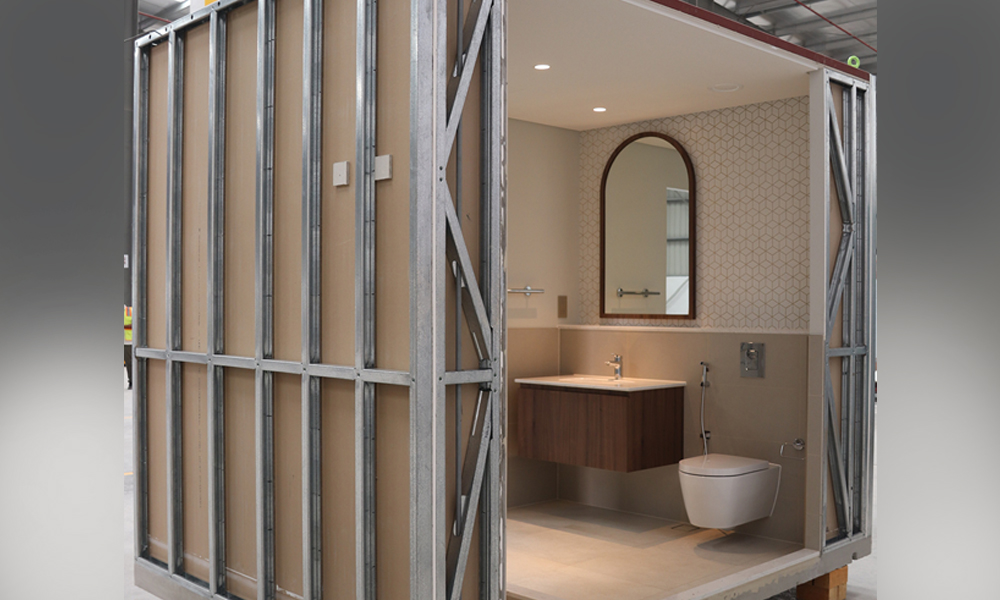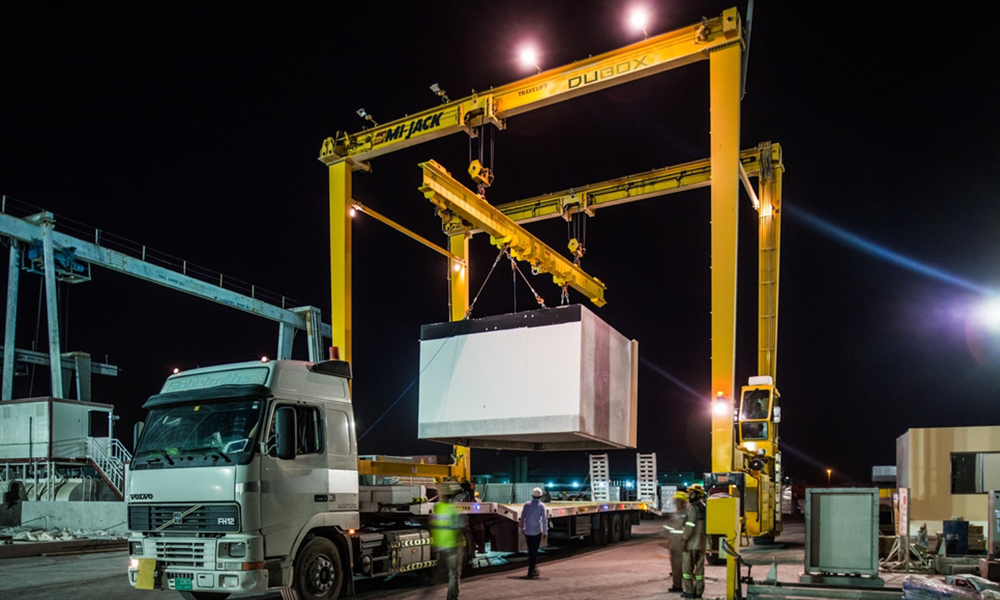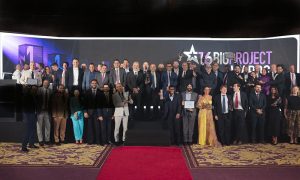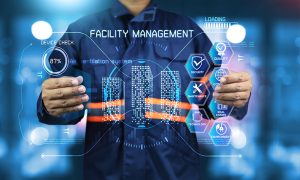Disrupting traditional project delivery
BPME speaks to Ihab Ramlawi, Co-founder and MD of DuPod about advanced project delivery, as well as trends and challenges in the regional construction sector

DuPod is a pioneer in modular manufacturing, with innovative plug-and-play bespoke solutions powered by an end-to-end tech-enabled platform. The company was founded on four pillars: productisation, market enablement, rapid scalability, and agile manufacturing.
By shifting construction to a controlled manufacturing environment, DuPod addresses inefficiencies and issues such as labour shortages, sustainability concerns, project delays, and delayed tech adoption. DuPod’s capabilities include offerings such as Utility Pods, Retail Pods, Living Pods, and Room Pods for the hospitality sector.
The firm notes that the Fourth Industrial Revolution (Industry 4.0) is based on ubiquitous connectivity and promises to significantly improve the way of doing business. In comparison, the Building Information Modelling (BIM) approach has been an essential enabler for digital transformation in construction. The DuPod 4.0 project is a visionary approach that will be the solution to meet the market’s requirement for intelligent and modular construction, while enabling the need to address the lack of modular know-how.
This technology platform will allow complete networked manufacturing systems in DuPod future intelligent factories, and personalised manufacturing is an alternative to traditional linear production processes, such as mass production.
Here, Big Project Middle East speaks to Ihab Ramlawi, Co-founder and Managing Director at DuPod about advanced project delivery and trends and challenges in the regional construction sector.
- What will drive the adoption of technology and advanced project delivery solutions in 2023/2024 in the Middle East? What will be the key drivers (sustainability, quality, cost etc)?
The industry is undoubtedly moving in the right direction. We’ve seen advancements in the digitisation of the supply chain and associated processes such as workflows and approvals. We’re now witnessing more digital skills coming into engineering and construction. Companies are starting to see technology’s opportunities to reduce wastage and duplication and control quality, time, and budget on projects.
Real-time access to the physical layer with abundant data will improve decision-making and provide financial incentives for project teams to collaborate. Technology adoption allows the industry to fully embrace a life cycle approach and ensure the prudent use of resources, significantly reducing energy usage and emissions. Using industrialised construction supported by digital technologies reduces inefficiencies and waste, translating to tangible cost savings and improving quality. Real-time monitoring, automated site data collection, and AI analytics tools enhance ongoing projects’ time and cost predictability.

- What are the three biggest issues that deter construction firms from adopting technology and innovative new project delivery methods? How can these internal challenges be overcome?
Despite being well-positioned to take advantage of the technology used by almost every other industry, the construction industry has been notoriously slow in digital adoption. The skill shortage, lack of training, and workers’ inherent aversion to technology play a huge role here. Most construction companies have recently stated that technological innovation is part of their corporate vision. However, very few had a solid technological integration strategy and dedicated R&D budget in place.
Digital transformation is slow in the construction industry is the complexity and fragmentation of the industry; the construction industry is highly decentralised, with numerous stakeholders involved in every project. This complexity and fragmentation can make it challenging to implement new technologies, as many different systems and processes need to be integrated, and each company and type of construction has unique needs.
The construction sector is gradually starting digitalisation through Construction 4.0, referring to the success of Industry 4.0 in the manufacturing industry. The thinking behind using the Fourth generation revolution in the construction industry system focuses on the physical-to-digital and digital-to-physical transitions to help coordinate, design and execute built environment infrastructure more effectively and efficiently. The improved value chain of construction projects, productivity improvement, and safe and sustainable construction will impact the industry. Construction 4.0 implementation would transform the construction process and the company and project frameworks, transforming the fragmented construction industry into an integrated one.
- What is your overall vision for integrating Industry 4.0 technologies into your business and the delivery of projects? What sort of benefits do you anticipate?
One of the most prominent emerging construction industry trends impacted by Construction 4.0 is offsite construction. It allows for designing, manufacturing, fabricating and building aspects of the job in a factory. For DuPod, the digital transformation journey was about building the muscles and a solid vision to excel and prosper. The technology transformation target is to create value for the firm, enhance its competitive advantage, and have a clear, integrated roadmap to trace and log where that value is, which is how successful companies get to the total value of this journey.
Our focus is on three different levels of integrations: horizontal, vertical, and end-to-end. Horizontal integration is related to integrating the resources and the associated information network within the value chain to collaborate transparently with stakeholders and provide real-time products and services. Vertical integration refers to the networked manufacturing systems in factories and bespoke manufacturing as alternatives to traditional linear production processes, such as mass production. End-to-end integration means it will be possible to implement an integration based on digital connection throughout the value chain.
By implementing our strategy, we aim for better sustainability, as digital processes are much better for reducing waste and carbon emissions and improving productivity by introducing automation and streamlining construction processes, resulting in more consistent results and more efficient production. This step will also improve the industry’s image and make the prospect of working in construction more attractive to a broader demographic with gender diversity and close the skill gap.
- What new technology has the potential to affect positive change in the industry in 2023? When do you foresee the adoption of this taking place?
Augmented and virtual reality (AR/VR) will gain traction before we see it in broader use. According to recent studies, this technology can cut the cost of construction drastically by preventing mistakes caused by insufficient or inaccurate data. AR and VR technology improve collaboration and communication and will streamline efficiency across the board and throughout different teams during a project.
Moving to a distributed ledger instead of having one single source can help make the process more efficient, transparent and accountable for all participants involved in the project in areas like payment and project management, procurement and supply chain management. Blockchain ensures a transparent distribution of information across all the network participants so that no one party controls the data.
This year will also witness more construction companies moving towards Artificial Intelligence and Advanced Analytics as AI is across all headlines nowadays. Over the years, contractors have struggled with inaccurate cost estimates, optimistic project timelines and discounting the risk associated with project planning in the design and bedding stage, and misuse of resources and project overrun in the execution stage.

- How will the built environment be affected by the recently announced decision to cut oil production till the end of the year by OPEC countries? Could this be a risk since transportation plays a prominent role in modular project delivery?
Oil prices suffered a significant drop recently as a response to the banking crises and the shortage of demand caused by inflation. Many reports state the oil cutting will drive the oil price to settle, and it is still under control; the rise in the prices will depend to a large extent on big importers for oil appetite, and the effect will vary among countries. Stability in the oil prices will impact our countries positively and will drive more expenditure, and that is important to the construction industry. The recently announced oil production cut would cause an imbalance in the logistics sector as transportation cost increases. Moreover, contractors need to plan the risk associated with the transportation cost.
- In the same vein, what changes do you anticipate in the built environment following the announcement by several countries/economies of their decision to move away from using the US dollar to trade?
The dollar faces challenges after an exclusive dominance, yet it still controls the foreign trade exchange worldwide. Despite the threats, economists believe that the dollar will not lose the battle soon as the currency’s stability has been acquired over the years and won’t tumble anytime soon. The recent move by some countries to walk away from the dollar drove it to a weaker position after standing at the highest levels. The impact of the weak dollar means the other currencies will be stronger, driving the cost of importing goods. Construction companies must account for the risks associated with the cost increase in the pricing strategy and the contractual terms.
- Discuss your client’s vision for the project that you leveraged modular construction/intelligent solutions to deliver? In line with the client’s vision, what were some of the key objectives that you wanted to achieve with this project?
The visionary idea of Industry 4.0 focuses on the digitisation of the value chain of a product and improving productivity through various technologies and automated manufacturing environments. With an industrial approach, the Modular Construction approach ensures that well-established manufacturing automation technology can be applied to construction.
DuPod 4.0 project was Inspired by the success in driving productivity executed by advanced manufacturing industries in applying Industry 4.0 principles. Modular construction introduction of industrialisation of construction allows for streamlining the project lifecycle process. It facilitates an effective adoption of technology and the potential to realise the integration of design, manufacturing & the supply chain to extract the benefits of effective real-time collaboration to drive efficiency and increase productivity.
This integrated technology platform will enable complete networked manufacturing systems in DuPod future intelligent factories, and personalised manufacturing is an alternative to traditional linear production processes, such as mass production. Process automation in modular construction uses automated systems to streamline the construction process and robotics, computer-aided design (CAD) software, and other technologies to reduce the manual labour required to build a structure. Automation can help to reduce costs, improve safety, and increase the speed of construction. Automation can also help reduce the amount of waste generated during the construction process and enhance the quality of the finished product.
- What were three of the key challenges that DuPod faced in the delivery of this project? How were they addressed and were you satisfied with the results?
The industrialisation vision created the need to invest in technology and facilities. Product and manufacturing innovation became important sources of competitive advantage, which led us to significantly boost expenditure in R&D spending to uncommon levels in the construction industry. Translating DuPod’s vision into a defined strategy so the board can perceive it as a refined business model that aims to perfect an intelligent tech-enables eco-system of industrialised construction infrastructure to elevate and differentiate paved the way to increasing the R&D expenditure. We pride ourselves today on having an independent department in the organisation’s structure dedicated to continuous improvement.
Another factor we faced was this lack of knowledge and exposure to new technologies in the construction industry, leading to uncertainties that will eventually contribute to resistance to adoption and change. We had to look for new ways to integrate expertise from other sectors to identify skills such as capabilities in design, manufacturing operations, and digital technologies to apply the new business model and take modular capabilities to the new attributed levels of optimisation. The solution was to open up a whole new realm of possibilities for knowledge sharing within the company with its special people search capabilities.
In addition, promoting a culture of innovation within the construction industry is essential. This can be done by encouraging experimentation and risk-taking and recognising and rewarding companies that embrace new technologies and ideas. This culture of innovation can help overcome the traditional culture prevalent in the industry, and make it easier for new technologies and ideas to be adopted and integrated into the construction process.

- What were the advantages DuPod realised by delivering this project with modular construction compared to more traditional delivery methods?
The lean offsite manufacturing process is far faster than the equivalent building process onsite. This is due to the enclosed and controlled factory environment, the ability to coordinate and repeat activities, and increasing automation. Quality control is much easier and better in a factory environment than on a construction site. Reducing or eliminating rework significantly improves construction schedules, potentially by three to six months.
The introduction of the DuPod 4.0 project was essential as the relationship between Modular construction processes and technology is vital. Using these digital technologies by applying real-time integrated frameworks and perspectives ranging from organisation, coordination, and implementation is a significant enabler.
We are still in the implementation stage; we cannot access up-to-date real-time data. However, several studies and reports demonstrate the benefits of Industry 4.0 in a manufacturing setup. The anticipated results will be a 30% increase in operational efficiency by optimising and automating the process and considerably reducing waste, energy consumed and labour force.
- What learnings did DuPod take away from working on this project in terms of enhancing modular delivery?
The journey to DuPod 4.0 is long, evolving as the technology is developing by the minute, monitoring and measuring digital transformation initiatives’ results, and making necessary changes to improve efficiency and effectiveness. Moreover, our focus will move towards continuously analysing and evaluating the strategy’s progress and making adjustments to ensure the goals and objectives are met. We expect throughout the advancement of the project, several technologies will gradually replace this human role, reducing human intervention and reinforcing a decentralised fusion between physical reality and its representation in cyberspace. The technology platform developed will allow complete networked manufacturing systems in DuPod future intelligent factories, and personalised manufacturing is an alternative to traditional linear production processes, such as mass production.
Our success will be measured by the actual translation of the strategy and the business model. As a result, we will deliver a solution to meet the market’s requirement for intelligent and modular construction while enabling the need to address the lack of modular know-how.























